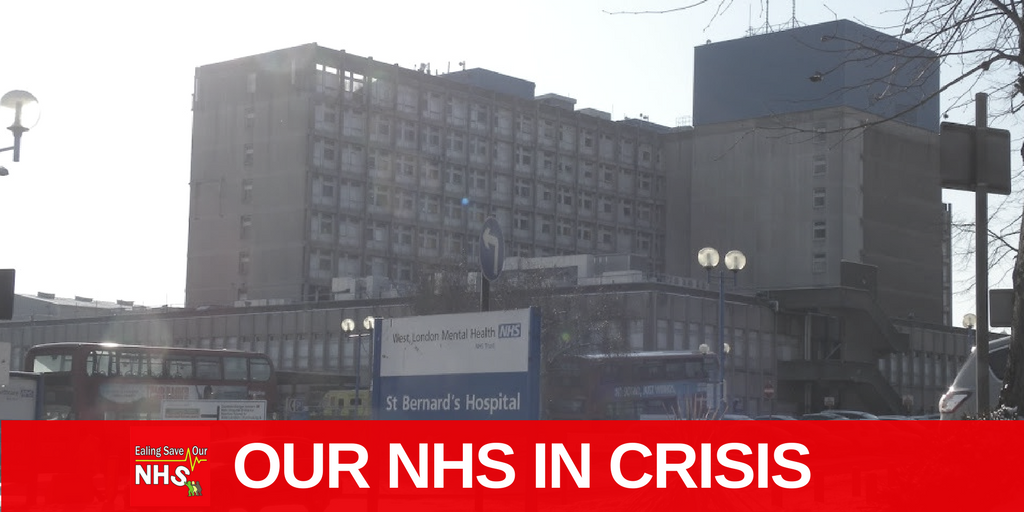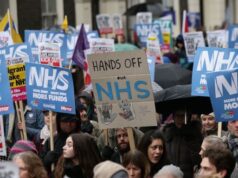ESON Presents Written Evidence to NHS NWL Bosses Which Demonstrates that NWL’s SaHF, STP and ACO Ambitions are Unattainable
On 6 and 7 February 2018 a submission, written by the Ealing Save Our NHS (ESON) research team, was delivered by hand to the Directors of Finance at NHSI (London) and NHSE (London). These two people had written to the two NHS North West London (NWL) CCG Accountable Officers on 7 November 2017, rejecting the NHS NWL SaHF business case. This ‘Shaping a Healthier Future’ business case – ImBC SOC1 – was rejected because of the lack of evidence presented to support the assertion that annual emergency (so called Non-Elective or NEL) admissions could be reduced by 99,000 by 2025/26. The business case asks for £513 million for building work, which would be needed – state NHS NWL – to eliminate Ealing District General Hospital.
The 6 February 2018 ESON letter pulls together evidence to show that this annual NEL reduction of 99,000 is quite simply completely unattainable. View the letter at:
‘Refreshing NHS Plans for 2018/19’- Moving the Goal Posts and Changing the Names Yet Again
This February 2018, 31 page document issued jointly by NHSE and NHSI is another tsunami of confusing jargon. STP became Sustainability and Transformation Partnership in March 2017. Now we are back to STP being Sustainability and Transformation Plan. Two new (new to me) funds have appeared – the Commissioner Sustainability Fund and the Provider Sustainability Fund. NHS bosses often, apparently, invent these funds to provide grants to organisations in order to help them in saving on costs. Reading ‘Alice in Wonderland’ might help you make sense of this clearly dysfunctional habit.
Our old property friend Naylor appears early on page 7 when we are told that ‘..the STP having a compelling estates and capital plan’. On page 8 we are reminded of a public consultation (closing 20 March 2018) on reducing prescribing of over-the-counter medicines for 33 minor, short-term health conditions as well as vitamins and probiotics.
On page 9 we see’…allow for 2.3% growth in non-elective admissions’. This is yet another nail in the £513 million NHS NWL SaHF ImBC SOC1 coffin.
More pie in the sky is found on page 9. ‘Our expectation is that Government will roll forward the goal of ensuring that aggregate performance against the four-hour A&E standard is above 90% for the month of September 2018, that the majority of providers are achieving the 95% standard for the month of March 2019 and that the NHS returns to 95% overall performance within the course of 2019. Are there any NHS front-line staff who actually believe these goals will be met on these dates?
On page 10 more beds and/or a 3.5% reduction of NHS and social care Delayed Transfer of Care /DTOCs (bed blocking) are sanctioned. Another target also appears for Referral to Treatment Times. The new aim is for the number of those people waiting 52 weeks for treatment to be halved by March 2019. However no 2018/19 winter weather forecast or predictions of the incidence of new strains of flu are included in the document.
Page 10 again – ‘…need to consider the capacity require to deliver growth in non-elective and elective activity and the impact on the workforce’.
The Re-naming of Parts
On page 12 Integrated Care Systems (ICSs) make their big entrance – explicitly replacing Shadow Accountable Care Systems (ACSs). How renaming makes any difference to a product or service offering is way beyond my understanding. Greater Manchester and Surrey Heartlands ICSs get plugs in here – I really do wonder whether either of them welcomes this spotlight. ICSs will replace STPs. It can’t be a co-incidence that there are two active Judicial Reviews questioning the ‘Accountable Care’ approach. How convenient that NHS bosses should swap out ‘Accountable Care’ and replace it with ‘Integrated Care’ right now.
On page 13 Capitated /Population Budgets seem to have got their marching orders. Could this be anything to do with one of the currently active Judicial Reviews one wonders? It states ‘All ICSs will work within a system control total, the aggregated required income and expenditure position for Trusts and CCGs within the system’. This statement is clearly missing a Local Authority (LA) social care component. But this is but one of many instances where NHS healthcare ‘trumps’ LA social care.
I could go on and on page by page, but I’ve picked out some gems:
+ STPs must be ‘stretching and realistic’. Whatever does ‘stretching’ mean in this context? Scalable or elastic maybe?
+ CCGs will have to submit new plans. Again oddly and worryingly there is no mention of new LA plans. How does/will healthcare and social care integration actually work?
+ Annex 1 contains a shocker. Just 131 new mental health beds will be opened in England April 2017 to March 2018. Parity of esteem anybody?
+ Since 2015 there have been just 770 additional GP trainees.
More at;
www.england.nhs.uk/publication/refreshing-nhs-plans-for-2018-19/
Surprise, Surprise! NHS Staff Retention is a Problem
‘Health Services Journal’ has reported that the NHS regulator NHSI is now working with 70 English NHS Trusts trying to improve staff retention. Is this really the role of a regulator one might ask? No doubt some good work is being done here in trying to make up for national cuts in training and education; ‘enhancing’ retire-and-return –to –work schemes; and promoting flexibility around rotas and career development.
With 11.4% of nurses leaving London NHS Trusts it might be a good idea for an NHS body to research in detail why this is the case. Anecdotally it seems that nurses are leaving because they are unhappy in their jobs. This is not rocket science.
However this initiative, if known by front line staff, might just annoy those overworked, understaffed, stressed-out hospital teams. For many of them time off for training and education is but an ageing dream.
It’s Government/DoH/NHS England policies that are leading to staff leaving the NHS. Quality and quantity of service needs to be designed into policies – it’s not something that can be re-engineered in dysfunctional policies.
This all seems like trying to wipe an elephant’s bottom with a piece of confetti, when what should be going on is trying to figure out why the animal has chronic diarrhoea and treating that condition in a sustainable fashion.
The NHS London North West Healthcare University Trust and the West London Mental Health NHS Trust have both volunteered to receive this NHSI human resource counselling.
DLA, PIP, ESA, AA, CA, UC and WCA – Theory and Practice
In this new, coming golden age of cradle to grave care (integrated healthcare and social care) there is acronym soup served up in care and care related benefits. Crudely below I’ve summarised what they seem to be all about and I’ve collected some data on how it is all working out:
DLA – Disability Living Allowance.
Introduced in 1992, it’s money for people who have extra care or mobility needs. DLA can be claimed by under 16s and those who were 65 or over on 8 April 2013. It’s means tested and tax free.
PIP – Personal Independence Payment.
Replaced DLA during 2013 -2015 for those 16 to 65.
ESA – Employment and Support Allowance.
For those who can’t work because of illness.
AA – Attendance Allowance.
Money for those people over 65 who have care needs and need help with activities of daily living. Not means tested and tax free.
CA – Carer’s Allowance.
£62.70/week. It’s means tested and taxable. The people you care for must be receiving DLA, PIP or AA and you must be caring for them at least 35 hours/week.
UC – Universal Credit
UC replaces six means-tested benefits and tax credits – Jobseeker’s Allowance, Housing Benefit, Working Tax Credit, Child Tax Credit , ESA and Income Support. Announced in 2010 the phased, national rollout began in 2013 and in Ealing in February 2018.
WCA – Work Capability Assessment.
The Department of Work and Pensions’ (DWP’s) test as to whether welfare claimants are entitled to sickness benefits.
+ The Conservative Government’s austerity is hurting or killing the sick and the disabled according to The Canary web site. Between October 2013 and October 2014, 46% of people who previously had DLA either lost money or had their claims stopped under PIP. 164,000 mentally ill people lost their PIP money in 2017.
+ Over £100 million has been spent on ESA and PIP appeals since October 2015. 87,500 PIP claimants had their decisions changed at mandatory reconsiderations, whilst 91,587 won their appeals at tribunal. In the first half of 2017, 60% of PIP appeals went in the claimant’s favour. In 2017/18, 68% of ESA appeals were won by claimants.
+ Between December 2011 and February 2014 almost 90 people a month were dying after the DWP told them they were fir for work. 590 cases of suicide have been linked to WCAs.
+ We are in the fourth year of UC and we have yet to see a full business case for this huge reform. The original key assertions were that UC would help people back into work and by 2017 save £5.5 billion on annual benefit costs. The original rollout costs were budgeted at £2.2 billion. This has now ballooned to £15.8 billion, the annual cost savings target date moved to 2021, and the UC national coverage will now be completed by late 2022.As with grandiose NHS cost savings programmes, grant funding is always paid out to help with transition. In the case of UC this amounted to £1.5 billion in 2017. However in 2016, the Office of Budget Responsibility forecast that the best annual cost savings by 2021 would only be £1 billion. The notorious six week wait for first payment is soon to be reduced to five weeks. In 2017, 19% of claimants waited longer than six weeks. The Labour Party has made repeated claims that the Government has not provided any evidence to back up its original assertion that UC would help people back into work. However research has shown that UC leaves working families are worse off than under the old system.
Notes from the Trenches and Elsewhere
+ CQC has announced that London North West University Healthcare University NHS Trust has performed ‘worse than expected’ in three core areas of its Maternity services compared to its peers. This is a sad postscript to the closure of the well-performing Maternity services at Ealing Hospital in 2015.
+ ‘Pulse’ Reports that NHS England admits that the national target of recruiting 600 extra GPs from EU countries by 31March 2018 has been/will be missed by 470
+ NHS London North West University Healthcare Trust only recently adopted ‘University’ into its name. But which University and why? Maybe adding ‘University’ to your name is felt by NHS branding gurus to add an academic ‘gloss’ to the organisation. However perusing the 15 person Board I’ve found a Professor David Taube of Imperial College Academic Health Science Centre (AHSC). Imperial College (IC) seems to have continuing ‘imperial’ ambitions. Some contrast to my 1960s days at London University when IC folks were largely beer swilling, rugby playing engineers! A recent non-exec recruit to the LNWUHT Board is Ruwan Weerasekera – a Managing Director of the Union Bank of Switzerland. How this fits with healthcare is at best puzzling and at worst worrying.
+ Meltdown at the Liverpool Community Health NHS Trust (LCHT) in 2014 provides salutary guidance in spotting dysfunctional healthcare leadership. Analyst Richard Vize has unravelled a litany of fear, intolerance, disbelief and insecurity over a four year period. Dr Bill Kirkup carried out an independent review. He identified an inexperienced and bullying leadership obsessed with achieving Foundation Trust status, irrespective of the effect on patients. Two NHSs CCGs and NHS England pushed LCHT to achieve significant savings. In one year LCHT tried to deliver 15% cuts, apparently oblivious to the risks. Appalling treatment of staff led to a collapse in morale and sickness absence rose. Reporting of serious incidents was discouraged. CQC failed to spot the problems and it was only when staff contacted Labour MP Rosie Cooper that alarm bells were rung in Government. The LCHT Chief Executive resigned but has been employed in the NHS ever since. She’s currently on the Betsi Cadwaladr NHS Board in North Wales. LCHT Chair Ms Frances Molloy also resigned and now runs a Liverpool-based charity that has NHS contracts. It would seem that nothing succeeds quite like failure.
+ An estimated 60,000 people marched through central London on 3 February 2018 in the ‘NHS in Crisis’ event. It was organised by Health Campaigns Together and The People’s Assembly. British media coverage of the event was poor but Donald Trump publicised it! 54 related events were held on the same day all over England.




